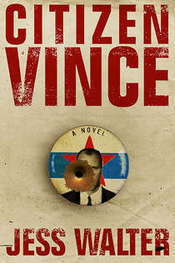Drew Myron's Blog, page 56
December 7, 2013
Don't you know anything?
 reminder no. 4 • a series by drew myron
reminder no. 4 • a series by drew myron
This is one in a series of reminders that serve as notes to myself (and now you). Is your head as crowded as mine? I suspect so.
See reminder no. 1.
See reminder no. 2.
See reminder no. 3.
December 2, 2013
Fast Five with Ruth Harrison

Because a few questions can yield great insight, please join me for Fast Five, short interviews with great writers. Life may be full but let's make time for five questions — and the chance to win a great book (see details below).
[image error]Ruth Harrison was born in Kansas, grew up in Colorado, and has lived in Oregon since 1950. She is a retired professor of medieval literature (teaching at Portland State University, Linfield College, and Oregon Coast Community College) whose poems have appeared in regional, national and international publications. She is author of two textbooks, three chapbooks, and seven poetry collections. Noting her value to the writing community, the Oregon Poetry Association, the state’s oldest and largest poetry organization, recently honored Harrison with a lifetime membership.
You primarily write in traditional poetic forms. Is there a particular form you favor, and why?
Well, the sonnet — because it is old and mossy, and lovely in its song-like qualities, hallowed by time — and by users like Shakespeare and Keats, leading the way. And the villanelle, which I attempted as soon as I learned its name (in a college class), in part because it sent me looking for a poetry handbook, which led me on to many other forms; and in part because it's a challenge to make the required repetitions not thud on the ear, not seem repetitious and boring. And the triolet because its repeat lines are not so many as the villanelle's, and because it's small and must convey its impact in a short space . . . There are many many short forms Madelyn Eastlund's Poets' Forum had introduced me to, that I have enjoyed no end. The cresset comes to mind for its lovely symmetry and slight rhyme requirements, just enough to make a poet work to get the exactly right word to make meaning and to suit the formal requirement. The struggle is good for us as writers and as craftsmen. And I enjoyed trying a form Lew Turco told me about, the rubliw (named, I think, for Richard Wilbur—?), that he and his fellow poets have enjoyed playing with at Iowa and later.
At what age did you begin to write poetry, and how has your writing changed over the years?
I was told I made verses from about age two, but of course was not yet writing, just making. And I made an occasional attempt in school years, fifth and sixth grades, and so on. Then a few efforts in high school and college classes have survived . . . some college efforts made it into a college anthology. My teaching years mostly put an end to the writing, because teaching is so all-consuming, but sometimes when my students were busy with an in-class writing project, I sat writing also, to add to the work-filled intense quiet atmosphere as much as anything. But I didn't give it concentrated attention until I retired from my final teaching position, in 1994.
You formed Tuesday, a writing group that has met every week for over 20 years. How has the group influenced your writing life?
Tuesday has been a singular blessing. It carries an automatic weekly deadline to have material ready for the next meeting; it encourages revision and craftsmanship; and it takes the loneliness out of the writing life. It provides a first audience for untried work, in an unthreatening setting — a good testing ground.
What’s the best writing advice you’ve received (or given)?
Keep writing.
Will you please share a favorite poem from your new book, West of 101.
This is one many hearers or readers have liked [in unrhymed iambic pentameter]:
Night Lights
It’s 2:13 and she is not asleep
but trying. She’ll go warm herself some milk,
sit with the quiet, and look across the waves,
inhale the pine tree scent, and pause before
returning to her bed . . . Take Christmas in:
plug in the lights, enjoy the silence, night,
the distant sound of surf, here near the glass.
The pane exhales a cool light essence, fresh
against her face.
She seems the only one
alive, awake here long before the dawn,
and watching the deep waves she knows are there
only because it’s west— that's where waves are.
Across the black . . . nothing alive in sight.
And moments pass in solitude and dark
But now a spark appears and disappears,
appears again. A crabber out there in
December’s endless night, his worklights bright.
On impulse, she unplugs the Christmas tree
and plugs it in again, to say hello
to light that speaks to her across five miles.
Three times the light blinks back, and she repeats
her greeting to the worker in the cold
before the boat is hidden by a surge
and swell of waters.
She lets go that breath
when light appears again, and sparks in sign
of living presence in that larger earth
the darkness opens.
A repeat flash says:
We’re all right here because the land is there
And every soul’s alone, but that is how
life is for all of us who’ve had the luck
to be born, and will have the luck to die.
We know you’re there, the only spark in sight
this holiday. And thank you for the light.
- Ruth Harrison
[image error]Win this book!
To win West of 101 by Ruth Harrison, simply add your name and contact info in the comments section below.
Your name will be entered in a drawing, and the winner announced on Sunday, December 15, 2013.
November 28, 2013
Thankful Thursday: The Big Doozy
It's the most Thankful Thursday of the year.
The Big Lebowski. The Big Mac. The doozy of all dizzy, grateful days.
Happy Thanksgiving! May all your days be filled with thanks — and ice cream (and books, and art . . . )
November 26, 2013
Four Great Books
I go to sleep reading, and wake up wanting more. I'm reveling in a buzz of really good poetry. Mind if I share my latest favorites?
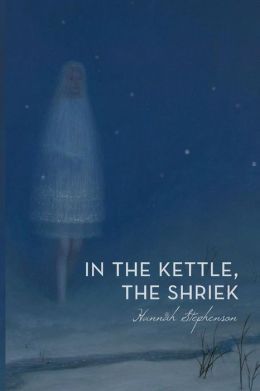 In the Kettle, the Shriek
In the Kettle, the Shriek
by Hannah Stephenson
In her debut collection, Stephenson writes in direct language that ushers you in. Like origami, these seemingly simple poems are taut, smart and beautifully complex. In poem after poem she masters the killer last line. (She also keeps The Storialist, a blog in which she writes a fresh poem daily).
You Can Do This
You have parallel parked in a space
just five inches bigger than your car,
smoothly. You know Queen Anne's lace
from poison hemlock. You are
adept in remembering names,
and people's small quirks, you know
who has cats or dogs, who trains
them. You know an Aries from a Virgo,
a Libra from a Taurus. You have worked
at 4AM, or for 15 hours in one shift,
spoken cheerfully while your life jerked
and jolted. You found a gown in a thrift
shop, and it is beautiful. You are learning
to call to what you love, to see it returning.
— Hannah Stephenson
[image error] Ninety-five Nights of Listening
by Malinda Markham
I'm over my head here but I can't stop reading. Markham's evocative, unexpected language is matched with a quiet, lonesome tone. Even when I don't "get" these often-opaque poems, I am moved by one stunning line after another. Here, see what I mean:
Once I told you
everything I knew in a language
you did not speak. This is love, is division,
a pile of memories catalogued like stars.
— from Postcard - Without Grace
I like simplicity, its single weight
I like the word fault for its power
to fit within the hand and consume.
Here is my arm and shoulder,
my throat and every word.
— from Mistranslate (Because Meaning Is Not Enough)
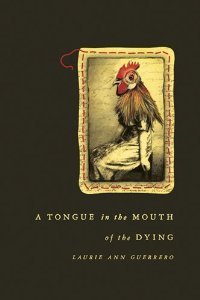 A Tongue in the Mouth of the Dying
A Tongue in the Mouth of the Dying
by Laurie Ann Guerrero
Vivid and visceral, this first book of poems by Laurie Ann Guerrero is consuming. From turnips to cow tongue to a playful ode to el cabrito (goat), Guerrero's work is both hungry and tender, carrying taste and memory, culture and loss. In choosing these poems for publication, Francisco X. Alarcon hails Guerrero's work as "the poetry of saints and sinners . . . rooted in the best Latin American, Chicano/a, and contemporary American poets."
One Man's Name:
Colonization Of The Poetic
vii.
My grandmother embroidered huipiles.
Named me the color of stone, lavender
in the sun. Wore a herd of elephants
on her middle finger, the baby always
almost dead. In white cotton thread on pink
cotton dress, she stitched swans to their heads,
made bloom red roses and white-flowered
Mala Mujer. She birthed nine children.
She now sits in a room where the faces are familiar
as snow and the hands that feed her are not her own.
She wears your name, a crown, Cortez:
queen of a tongue no one understands.
What have you done?
— Laurie Ann Guerrero
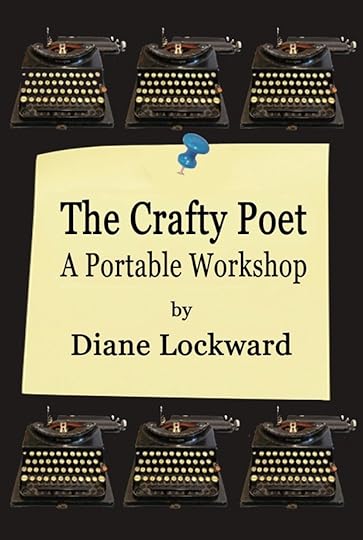 The Crafty Poet: A Portable Workshop
The Crafty Poet: A Portable Workshop
by Diane Lockward
Do we really need another how-to-write poetry book? Yes, if it's this rare find. Packed with prompts, this book rises above others with sample poems, insightful interviews, and beyond-the-basics advice. Here's how I know this book works: I've marked every other page with a sticky note, have written notes in the margins (something I haven't done since college), and I'm writing a flurry of fresh poems.
Your turn: What are you reading? Have you read these? What books have you abuzz?
November 23, 2013
Love that line!
Len Huggin's face
is a conference
of bad ideas:
baby corn teeth,
thin lips,
broken nose,
pocked cheeks,
and two bushy
black capital-L
sideburns.
November 21, 2013
Thankful Thursday: The Fever of Life
From pebble to peak, from profound to profane, it's time again for Thankful Thursday.
Because attention attracts gratitude and gratitude expands joy, it's time to slice through the ugly and get to the good.
This week I am thankful for:
1.
A sappy, glossy, implausible but entertaining movie.
2.
Chlorine, baby powder, fresh towels — the smell of clean.
3.
My sister's laugh, recovered.
4.
A friend sends a prayer that I take for poem. We share a history and love, and the thread connecting us seems prayer itself:
Support us all the day long, until the shadows lengthen, and the evening comes, and the busy world is hushed, and the fever of life is over, and our work is done. Then in your mercy, grant us a safe lodging and a holy rest, and peace at the last. Amen.
5.
A good run.
What are you thankful for today?
November 17, 2013
Missing: Journal
I lost my journal.
It's not inside, outside, in garbage, or car. Not under the bed, in dresser or drawer. It's a sick and sinking feeling, akin to losing a wallet, with just a little less panic.
And yet. It was only a journal. Not fancy, not leather, not handmade or gifted. Just a cheap grocery store book of blank pages. Like a glass, it was half empty, or half full. And, really, the writing wasn't great.
Still. I'm distraught. And guilty.
I've been lazy. I haven't been running, or eating greens, or doing planks (like I promise myself every other month, and achieve for about three days). I've been a slacker. And it is with this mindset that just two days ago I went to my journal and carefully copied a passage from Walking on Water by Madeleine L'Engle:
If the artist only works when he feels like it, he's not apt to build up much of a body of work. Inspiration far more often comes during the work than before it.
Like a child, I drew big loopy stars for emphasis.
I've kept a journal since I was a kid. And while I've culled and tossed evidence of the early years (the fourth grade diary, the seventh grade confessional), I've kept the tomes chroncling my turbulent 20s and maturing 30s, carting the heavy boxes across time and states. They are damp, musty, tattered, and mostly unread.
A few years ago, I inadvertently opened one of the boxes. Instead of finding a string of Christmas lights, I encountered a menagerie of admissions. For several hours, I sat huddled and squirming with an uneasy realization: All these years later — more than 20! — I still carry the same insecurities and sing the same refrain: "not good enough, not good enough, not good enough." Time has just made my worries deeper and more defined. It was sobering, and I immediately wanted a new me.
Why didn't I, then and there, declare a fresh start? Why didn't I drive to the dump, and like old clothes, bad boyfriends and poor choices, toss them out? Novelist and poet Sherman Alexie has a theory:
I think every writer stands in the doorway of their prison. Half in, half out. The very act of storytelling is a return to the prison of what torments us and keeps us captive, and writers are repeat offenders.
While searching for my journal, I kept saying, It's not the journal, it's just . . . It's not the journal, it's just this gloomy sky. It's just this extra weight I carry. It's just became every sad and sorry thing.
In my mix of agitation and despair, I told my husband (who was patiently searching the cavity of every appliance as if the journal had raced to the refrigerator for refuge) that I thought this was my punishment. Y'know, use it or lose it, I explained. I'd been lazy and my writing tool disappeared as a sort of vague but very-real-to-me karma.
Yes, I was over the bend, but my mind wouldn't stop spinning.
I recalled a recent poetry class in which the instructor asked, What must you have to write?
My favorite pen, said a woman.
Coffee, said a man.
A desk.
Smooth, lined paper.
These writers with their particulars, I thought. Let's not get precious about it. C'mon, who hasn't jotted words on an envelope? Or, while driving, rooted around for the back of a receipt? I've written in crayon, in big fat Sharpie, and even with chalk.
And so, my smug came back to smack me. What do I need to write? I needed my specific, half-completed pages of mediocre writing. I was frantic for my journal.
As the day wore on and more pressing matters arose, I gained perspective. Perhaps the message of the missing journal is not punishment, but reminder: Words are fleeting. Show up. Hold lightly.
Today I went to the store and bought a new, not-at-all fancy journal. Once filled, the journal will join its companions in my history boxed in the closet.
I lost my journal, I wrote on the first smooth, blank, page, and now I start again.
November 12, 2013
Housekeeping: Notes
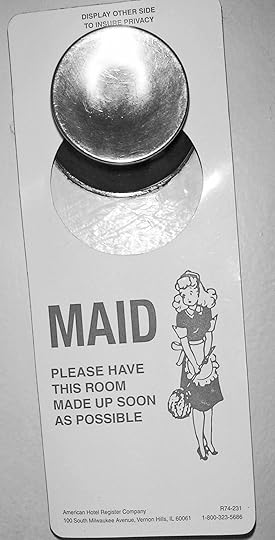 Hello!
Hello!
The world is big, time is short, your life is full — all of which swells me with gratitude for your attention. Thank you for reading my blog.
I’ll try not to waste your time, but instead stir your head, pry your heart. Together we’ll stretch our writing minds and build creative muscle.
Where you'll find me
In this big world, I'm so happy you found me. How'd you wind up here? Do you use a blog organizer, such as Feedly or Bloglovin'? Or do you bookmark this site and dip in on occasion?
The easiest way to read this blog is to subscribe by email. Simply type your email address into that little box at the right, and each time I write a blog entry, the post will be delivered directly to your email (and I cross-my-heart promise not to spam, nag, brag, or share your email).
Talk to me, baby
My heart does a jig with your feedback, so please join in the blog conversation — agree, argue, question & prod! Here's how:
For email subscribers:
1. When you receive the Off the Page email, scroll to the bottom of the message to see this line:
You are subscribed to email updates from Off the Page.
2. Click on the "Off the Page" link (shown above, in blue). This will take you to the live website (rather than the email version).
3. At the website, scroll to the end of the blog post and click on "Comments." Type your comments in the box marked "Post." This is where you'll type your comment so that others may see your feedback. This is where you may view comments from others.
For web readers:
1. Scroll to the end of the blog post and click on "Post a Comment" or "Comments." This is where you type your response so that others may see your feedback. This is where you may view comments from others.
Whadya wanna read?
So, tell me, what turns your crank, floats your boat, gets you revved to write? I'm eager to please (though not desperate, no really) and I want to know what you'd like on the menu. More meat, less dessert? Dim light, more wine?
What makes you tune in, or — gasp! — turn away?
But first, and again, thanks for meeting me here. The world has much to offer, and the pull and tugs are many. I appreciate you, and always enjoy our time together.
Write on,
[image error]
November 7, 2013
Thankful Thursday: Quietly Yourself
It's Thankful Thursday. Please join me in a weekly pause to express appreciation for people, places, poems and more. Some days gratitude is sweeping and grand, some days quiet and small. But always the more I look for thankfulness, the more I seem to find.
Today, I'm thankful for this poem, for its warm start and wonderful turn, and those stunning last three lines:
How Wonderful
How wonderful to be understood,
to just sit here while some kind person
relieves you of the awful burden
of having to explain yourself, of having
to find other words to say what you meant,
or what you think you thought you meant,
and of the worse burden of finding no words,
of being struck dumb . . . because some bright person
has found just the right words for you—and you
have only to sit here and be grateful
for words so quiet so discerning they seem
not words but literate light, in which
your merely lucid blossoming grows lustrous.
How wonderful that is!
And how altogether wonderful it is
not to be understood, not at all, to, well,
just sit here while someone not unkindly
is saying those impossibly wrong things,
or quite possibly they’re the right things
if you are, which you’re not, that someone
—a difference, finally, so indifferent
it would be conceit not to let it pass,
unkindness, really, to spoil someone’s fun.
And so you don’t mind, you welcome the umbrage
of those high murmurings over your head,
having found, after all, you are grateful
—and you understand this, how wonderful!—
that you’ve been led to be quietly yourself,
like a root growing wise in darkness
under the light litter, the falling words.
— Irving Feldman
from Collected Poems: 1954- 2004
via A Year of Being Here blog
What are you thankful for today?
November 4, 2013
This is a Letter to November
This is a Letter
This is a letter to the worm-threaded earth.
This is a letter to November, its gray bowl of sky riven by black-branched trees.
A letter to split-tomato skins, overripe apples, & a flock of fruit flies lifting
from the blueing clementines’ wood crate.
To the broken confetti of late fall leaves.
This is a letter to rosemary.
This is a letter to the floor’s sink & creak, the bedroom door’s torn hinge
moaning its good-night.
This is to the unshaven cheek.
To cedar, mothballs, camphor, & last winter’s unwashed wool.
This is a letter to the rediscovered,
to mulch, pine needles, the moon, frost, flats of pansies, the backyard,
hunger, night, the unseen.
This is a letter to soil, thrumming as it waits to be turned.
This is a letter to compost, eggshell’s bone-ash chips, fruit rinds curved like
fingernails, & stale chunks of bread.
A letter to the intimate dark—mouth-warm & damp as a bed.
This is a letter to the planet’s scavenging lips.
— Rebecca Dunham
It's the start of a new season, with shifts in air and time and tone.
Each autumn I return with delight to this rich and visual poem by Rebecca Dunham. I often use this poem as a prompt for my own writing, and its skillful rhythm and repetition makes for a great piece to share with young writers. Together we write "letters" instead of poems, reducing the inherent pressure of poem crafting. And — surprise! — those letters often result in striking pieces.
Do you have a favorite poem that marks this season?


